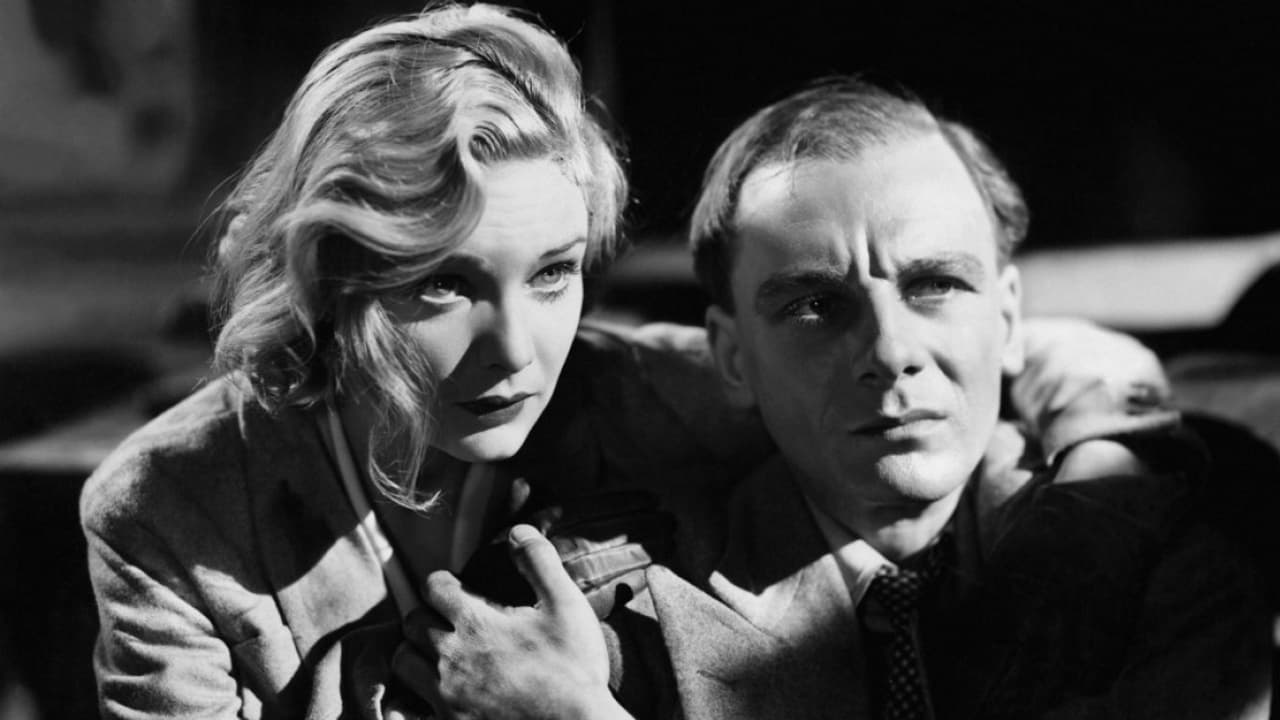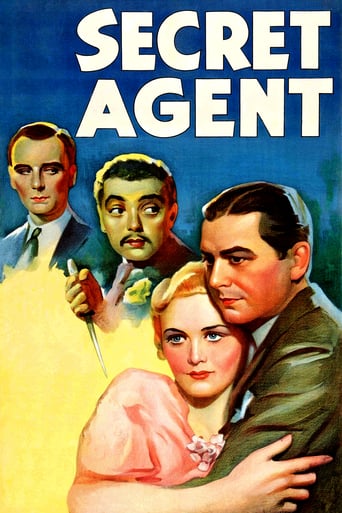

Brilliant and touching
... View MoreBad Acting and worse Bad Screenplay
... View MoreI think this is a new genre that they're all sort of working their way through it and haven't got all the kinks worked out yet but it's a genre that works for me.
... View MoreThe best films of this genre always show a path and provide a takeaway for being a better person.
... View More'Secret Agent' is probably Hitchcock's most underrated film. It sets nice atmosphere, it is fairly thrilling and it is entertaining. The ending might be abrupt and unsatisfactory, but in general, it is good movie. The hero (John Gielgud) being little bit reluctant towards his mission, while allowing his sidekick to perform most of the heroics, is nice touch. Madeleine Carroll is sweet as Elsa Carrington, a female spy, and like usually in Hitchcock's movies, she is not just token woman for eyecandy. Robert Young is quite typical suave British playboy who can't stop flirting with gorgeous Elsa. John Gielgud is charming as British spies always. Some call his performance bit wooden, but I saw it part of the character's unwillingness to complete his mission. And then there was Peter Lorre's over the top General. It was very stereotypical portrayal of Mexican, but, oh boy how he must had fun.Some of the most fantastic moments were where the director played with the sound, like the scene in the bell tower when Ashenden and The General whispered into each other's ears. Besides the humor and fantastic 'cloak and dagger' games, Hitchcock managed to create one perfectly eerie moment with the dog in the hotel room. What a way to warn the viewer that something awful is about to happen. All in all, very good spy thriller, plus, how many times you can see the German actor portraying Mexican in British film. Oh the good old times.
... View MoreThis film is based upon the novel of the same title by Somerset Maugham. It is set in 1916, in the middle of the First World War. The hero's name is Ashenden, and the novel was filmed as a mini-series (of 220 minutes) entitled ASHENDEN in 1991, starring Alex Jennings as Ashenden. I saw that at the time, and remember thinking it long, excessively languid, and not very good. In 1959, the story was filmed as an ITV Play of the Week for British television, but IMDb does not even record the cast or running time of that production, so we know nothing of it. The role of Ashenden in Hitchcock's film is played by the young John Gielgud. That casting has often been heavily criticised, as Gielgud was rather effete and feeble to play the role of a war hero whose death in combat is faked so that he can be sent under a false name (Ashenden) on a secret mission to assassinate a German spy in Switzerland, before the spy can escape to Constantinople and enemy territory. However, I am inclined to think that Hitchcock knew very well what he was doing by casting the febrile Gielgud. It was not Gielgud's first film appearance, as some have thought, for he had already appeared in four previous films, the last being a Jessie Matthews musical (of all things!). But Gielgud did then think of film work as slumming, and made no secret of it. I believe that Hitchcock intentionally wished to highlight the deviousness and hypocrisy of the sort of people who did what one old-timer once described to me as 'a bit of polite espionage'. (Yes, that is an accurate quote of a man describing to me many years ago the work of his son-in-law Colonel John N. as a British military attaché.) Gielgud's arch manner and the ludicrous pantomime of a relationship between him and Madeleine Carroll, together with all the other social niceties and absurd affectations surrounding them in the film appear to be things which sickened Hitchcock, who had grown up in Limehouse amongst real people. I do believe that Hitchcock was trying to poke fun at all of those pretensions of his era, and that Gielgud was his unwitting tool in doing so. That is only my theory, and you may dismiss it if you wish. It is interesting that this film is based on THE SECRET AGENT by Maugham, and that Hitchcock's other film which came out in this same year, SABOTAGE (1936, see my review), was based on THE SECRET AGENT by Joseph Conrad. That's a lot of secret agents in one year. But then, the Nazis were on the rise, and most people sensed another war coming with the beastly Germans. Peter Lorre reappears in this film, making his second appearance in a Hitchcock film, the previous one having been THE MAN WHO KNEW TOO MUCH (1934, see my review). In the earlier film, Lorre had been brilliantly menacing, whereas in this film he is called upon to play an assassin who is a bit of a fool, in a manner which is not so much creepy as very silly. He only comes alive with some effective acting during the inspired section of the film which is set in the Swiss chocolate factory, which has been acting as a clearing house for German espionage communications. Hitchcock really 'does his stuff' in the chocolate factory, with some amazing sequences showing his usual cinematic genius. But perhaps the weirdest and most effective sequence in the entire film is when Madeleine Carroll is sitting and talking in a hotel room with the dreary, droning wife (a brilliant bit of casting) of a German man who has gone mountain climbing with Lorre and Gielgud, who wrongly suspect him of being a spy and intend to murder him on the mountain. The couple's little dachshund starts whining and clawing frantically at the door of the room, sensing paranormally that his beloved master is in danger, and trying to get out to save him. Just as Gielgud watches through a telescope as Lorre pushes the man over the edge of the mountain, the dachshund stops scratching at the door to get out and sets up a mournful howl of loss and grief. Charles Frend's brilliant editing and cutting back and forth between the mountain and the dog in the room builds incredible tension, and when the innocent man is killed, the sight of his dog bereft and howling highlights the tragedy of this mistaken assassination in a manner which is uniquely bizarre and effective. One could call that the most inspired touch in the whole film. The point of the action of the film is said to be to prevent a military disaster 'in the East'. At that time the Ottoman Empire still existed and was an ally of Germany. Early in the film, when Gielgud is being briefed in London by the Foreign Office, he is told: 'The Germans are trying like mad to buy up the Arabs.' As this film was being made, the SS were doing precisely that. Having the Grand Mufti of Jerusalem up their sleeve as a reliable 'quisling' fascist leader for their planned 'German Middle East', they realized that they would need a reliably fascist and anti-semitic civil service to serve under him. So they poured vast sums of money into the small and fanatical Muslim Brotherhood, whose found was an admirer of Hitler. That Islamo-fascist organisation is still with us, and is effectively a creation of the Germans, just as hinted in this film. Once again, Hitchcock was anticipating dangers of the future, as he did with the exploding London bus in SABOTAGE (see my review).
... View MoreOne of director Alfred Hitchcock's weaker, early films loosely based on two of W. Somerset Maugham's Ashenden stories and a play by Campbell Dixon based on a third; Charles Bennett adapted them for the screen, Ian Hay and Jesse Lasky Jr. provided additional dialogue, and the director's wife Alma Reville also contributed.It's a mystery thriller with a romance drama angle between John Gielgud's and Madeleine Carroll's characters; Peter Lorre plays a typically unique character, a womanizing assassin. Robert Young plays a debonair American gentleman; his role is additionally against type for the actor (as is Gielgud's).Richard Ashenden is a British novelist who's just returned from World War I a hero. However, his death is reported by his country's government so that they can utilize his talents as a spy. He's to travel to Switzerland to stop a spy working for the opposition from making it into Germany. His cover includes a wife, Elsa (Carroll), and he's assigned an attache who's to do the dirty work (e.g. execute the foreign agent), the General (Lorre). In the process, they (actually, the General) accidentally kill the wrong man (Percy Marmont), a kindly old man. This so sickens Ashenden and Elsa, who'd only been looking for adventure, that they decide to quit the service and make a life together for themselves.But just as the couple's about to leave, the General informs Brodie, Ashenden's undercover name, that he's made a valuable contact (through Lilli Palmer's character) in a chocolate factory. While the two of them are chasing around those environs, flaky Elsa decides to run off with an American, Robert Marvin (Young), who'd been flirting with her.Brodie and the General discover that Marvin is the foreign spy and assume, when they Elsa boarding a train for Germany with him, that she's somehow figured it out too. They board the train as well, and the truth is revealed a short time before the train is attacked by the British, who weren't taking any chances in letting Marvin cross the border. A spectacular train crash kills the spy and his intended assassin, while Ashenden and Elsa survive to be together in the end.
... View More"Secret Agent" tells the story of a two secret agents who pose as a couple as they attempt to capture and kill a German agent, "Secret Agent" was possibly an original Hitchcock story and one of the earlier spy films. However, an interesting premise, two great lead performances by Carrol and Gielgud is botched by poor storytelling, an overlong duration and the highly irritating character that Peter Lorre portrays. Lacking suspense and all the elements that make Hitchcock a master director and my all time favourite director, the only redeeming qualities found in this bloated Hitchcock picture are the attempted story its telling, an interesting romance story developing between the two leads and the two lead characters themselves. "Secret Agent" is the biggest step down from "The 39 Steps" that Hitchcock could seek. If his intentions were to make a film that is in every right, worse than its predecessor, he has succeeded otherwise its simply not something he'd want to remember.
... View More